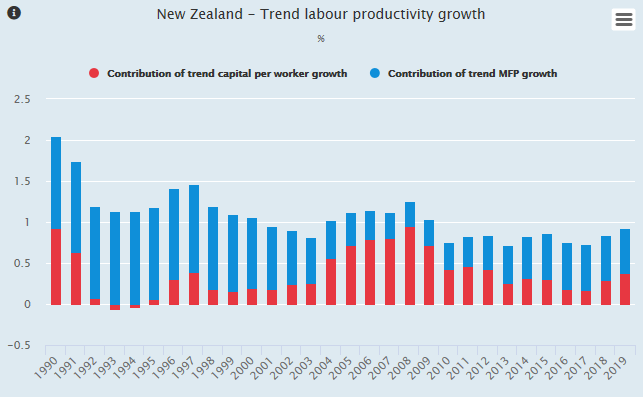Productivity Profile of New Zealand
 Organisations
Organisations
In the New Zealand public sector, productivity-related research and policy advice is conducted by the:
- Productivity Commission/Te Kōmihana Whai Hua o Aotearoa
- Ministry of Business, Innovation & Employment/Hīkina Whakatutuki
- Treasury/Te Tai Ōhanga
- Reserve Bank/Te Pūtea Matua
 Selected Publications
Selected Publications
Macro/sectoral overview: Productivity by the numbers (2021)
Recent micro research: Migration and firm-level productivity (2022); Who Benefits from Firm Success? Heterogenous Rent Sharing in New Zealand (2022); What Drives the Gender Wage Gap? Examining the Roles of Sorting, Productivity Differences, Bargaining, and Discrimination (2022); Firm Productivity Growth and the Knowledge of New Workers (2022); Living on the edge: An anatomy of New Zealand's most productive firms (2021); Do Workers Share in Firm Success? Pass-through Estimates for New Zealand (2021); Picking up speed: Does ultrafast broadband increase firm productivity? (2021); Benchmarking the Productivity Performance of New Zealand's Frontier Firms (2021); Productivity in New Zealand: The role of resource allocation among firms (2020); Competition and productivity: Do commonly used metrics suggest a relationship? (2019); Absorptive capacity in New Zealand firms: Measurement and importance (2019); Worker Flows, Entry and Productivity in the New Zealand Construction Industry (2018); Intangible Investment and Firm Performance (2018); Firm productivity growth and skill (2017)
Data: Improved productivity measurement in New Zealand's Longitudinal Business Database (2019); A Rough Guide to New Zealand's Longitudinal Business Database (2016); Production function estimation using New Zealand's Longitudinal Business Database (2015)
Productivity Commission of New Zealand: recent reports, completed inquiries, ongoing inquiries;
OECD: Economic Surveys New Zealand (multiple years)
 Data
Data
Click here to access our Compare-Your-Country tool and explore productivity data from the GFP member countries.

 Latest OECD Recommendations
Latest OECD Recommendations
- Ease FDI screening requirements, clarify criteria for meeting the net national benefit test and remove ministerial discretion in their application. Encourage more extensive use of advance rulings on imports. Sell remaining government shareholdings in electricity.
- Adopt different regulatory approaches for land use in natural and built environments. Make the planning system more responsive in the provision of key infrastructure. Implement road pricing to reduce urban congestion and diversify urban infrastructure funding sources. Ensure that restrictions on foreign ownership do not hinder property development. Extend the holding period during which capital gains on residential property (other than the principal residence) are taxed from two to five years.
- Further boost support for business R&D investment, notably by increasing the R&D tax credit to a more internationally competitive rate, to help lift R&D expenditure to the 2% of GDP target by 2027. Make the tax credit refundable so that firms that are not yet profitable can benefit. Evaluate remaining grant programmes. Co-ordinate immigration and education policies with business skills needs for innovation.
- To address equity financing gaps, shift the allocation of the NZ Venture Investment Fund to provide greater support for early-expansion-stage firms.
- Move towards privatisation of state-owned enterprises (SOEs), and consider reducing local government ownership of port assets to bring more market discipline to the sector.
Related Documents


